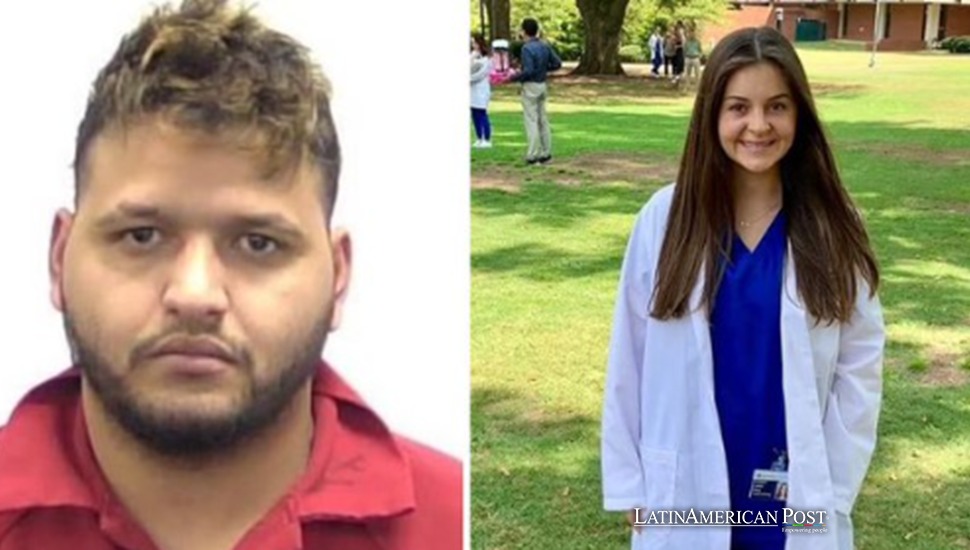Venezuelan Migrant’s Trial Casts Light on Tragic Murder Case

The murder of nursing student Laken Riley by Venezuelan migrant Jose Antonio Ibarra has shocked the small college town of Athens, Georgia, and ignited heated debates about crime and immigration in the United States. The trial reveals harrowing details of the brutal killing.
A Morning Run Turns Tragic
On February 22, 2024, 22-year-old nursing student Laken Riley started a morning run at the University of Georgia campus. She took her usual path through a forest near the sports fields. By midday, her friends said she was missing. Hours later, police found her lifeless body near a lake. This discovery led to a scary story of violence.
Prosecutors allege that Jose Antonio Ibarra, a 26-year-old undocumented migrant from Venezuela, attacked Riley with a rock and asphyxiated her when she resisted his assault. “This was a crime of opportunity—brutal and deliberate,” prosecutor Sheila Ross told the court during opening arguments.
Riley’s smartwatch, a Christmas gift, provided crucial evidence, recording her movements and heart rate during her final moments. At 9:10 a.m., the device logged an abrupt stop, followed by an SOS activation on her phone. By 9:28 a.m., the data showed that Riley’s heart had stopped.
“This watch told us what Laken couldn’t,” Ross said.
A Venezuelan Migrant’s Troubled Past
Ibarra’s immigration status and criminal past have caught a lot of attention. He entered the United States without permission in 2022. At first, authorities detained him, but then they released him on parole to continue processing. In September 2023, police in New York City arrested him. They charged him with putting a child in danger and breaking a motor vehicle law. Still, authorities released him before they could issue an immigration detainer. He was set free before facing additional immigration measures.
By February 2024, Ibarra was living in Athens, Georgia. His indictment revealed a disturbing pattern of behavior, including a charge under Georgia’s “Peeping Tom” law for spying on a student in a campus apartment on the same day as Riley’s murder. Advocates for immigration reform argue that while Ibarra’s actions are heinous, the case should not overshadow the contributions of millions of law-abiding migrants.
Evidence Points to Ibarra
Prosecutors built their case on clear forensic evidence. DNA found under Riley’s nails matched with Ibarra’s. His thumbprint showed up on her phone. Police saw scratches and bruises on Ibarra’s hands, arms, and neck. Signs of a fight were obvious.
Sgt. Kenneth Maxwell, a police officer at the University of Georgia, found Riley’s body. Camera footage revealed Maxwell discovering Riley’s body. Her clothes were partly on, and clear struggle marks were visible. “Someone tried to move her,” Maxwell said, his voice filled with sadness. People in the courtroom became very upset, especially Riley’s family. Many left the room to avoid seeing the distressing images.
A Divided Town
The trial has darkened the mood in Athens, Georgia. Riley’s murder has sparked intense debates about crime, safety at universities, and immigration. Some people are calling for stricter immigration laws, while others warn against blaming an entire group of people.
Riley’s family and friends are seeking justice for her. She was a young woman with a bright future—an ambitious girl recently named to the dean’s list at Augusta University’s College of Nursing. Those who knew her described her as hardworking and determined.
The University of Georgia put up more road cameras and lights to help keep people safe after the tragedy. Many people think these changes happened too late. The Athens community is unfortunate and watches the trial closely. They feel upset because the system lets her killer stay in the country.
Seeking Justice
If convicted of the most serious charges, including malice murder and aggravated assault with intent to rape, Ibarra faces a prison sentence without the possibility of parole. Prosecutors have stated that they are not seeking the death penalty. “This case is really about justice for Laken and preventing future tragedies,” Ross said.
Riley’s family believes no words can genuinely mend their loss. Steiner said, “Laken was more than just a victim. She was a wonderful daughter, a friend, and a bright light in our world. Her memory really deserves justice.” Their hearts ache without her, honestly.
Also read: Argentina’s Menéndez Brothers: The Schoklender Case Amid Calls for Resentencing
The trial proceeds, but one thing remains clear. This case impacts more than just lawyers and judges. Athens carries its deep scars. It affects many lives and even changes the extensive conversation on crime and immigration across America.





